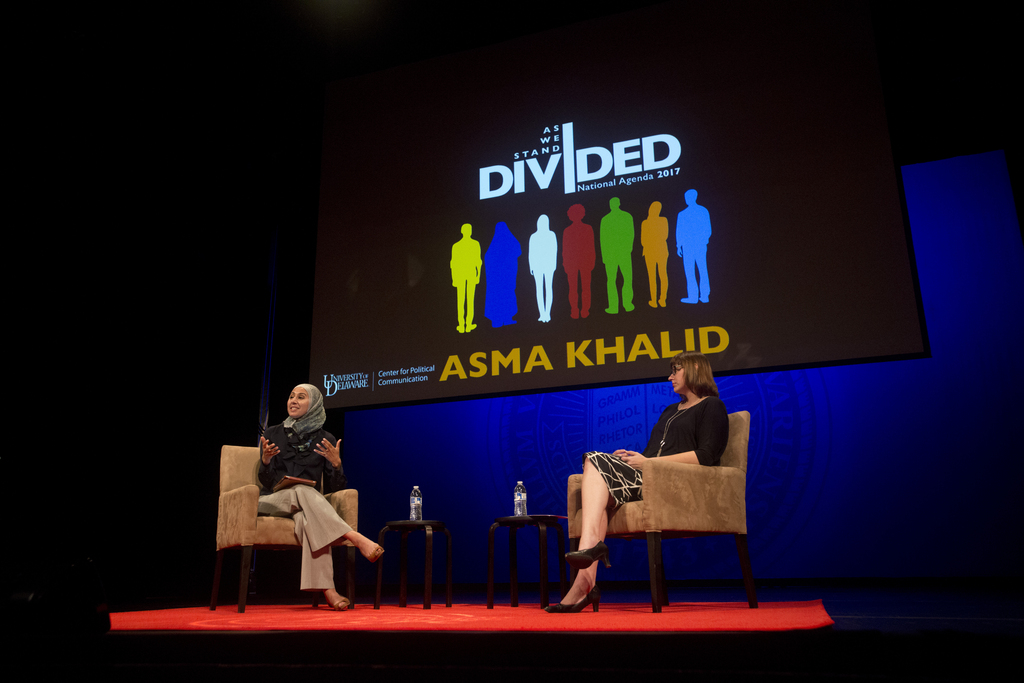Journalist examines religious divides : New fissures in American politics
Journalist examines religious divides in 2016 election
Event Review: Watch the video. Read the transcript. Listen to the podcast. Media Review: Read about it in The Review.
October 11, 2017 – The University of Delaware welcomed NPR journalist Asma Khalid to Mitchell Hall Auditorium on October 4. Khalid addressed the topic of religious divides for the National Agenda 2017 speaker series, “As We Stand | Divided.” Khalid covered the presidential election of 2016 for NPR and WBUR in Boston. She is also a founding member of the NPR Politics Podcast. After the election, Khalid drew attention with her essay, ?What It Was Like as a Muslim to Cover the Election,” where she described public reaction as she traveled the country talking to voters at town halls, rallies, churches, and diners.
Khalid grew up in a small town in Indiana. “The environment I grew up in, everybody had a faith. Being Muslim was not really a point of division.” As a reporter for NPR, she focused on the intersection of demographics and politics. “The goal was to look at fissures along race, age, education levels, ethnicity, and religion.”
“It probably took me until after the Nevada caucuses in February to get a sense of how toxic things were becoming,” said Khalid. “At that point, I was too heavily invested to quit. This election cycle has exposed fissures in our society that I hadn’t seen before.”
Before the election, “Anti-Muslim rhetoric was coming from haters, now it’s coming from the GOP presidential nominee.” said Khalid. “In terms of the religious divide during this election, evangelical voters voted for Christian values.” They felt that the Republican party’s conservative nature would benefit them.”
“For many, it was their faith? that drew them to the Republican party candidate. On the other side, “many Muslims voted for the Democratic party candidate.” Khalid found it to be an “interesting crystallization.” She said, “When I was growing up, those divides did not exist in my mind … and yet they were probably the two starkest religious divides I saw in this election cycle.”
Understanding Muslim Americans

While reporting on the election, some people treated her differently. Khalid recounted an interaction while accompanying a canvassing group in Ohio. While she was recording an interview with a young woman, the woman’s mother could be heard saying, “There’s a Muslim on my property, get her off.”
Khalid advocated speaking with Muslims and understanding their experiences. Khalid hopes that by acknowledging other people’s humanity, Americans may overcome the religious divides in this country. “By exposing yourself to different types of people and different types of ideas, at the very minimum you”ll understand a little bit more.”
“When it comes to Muslim identity, I think it is really helpful for folks to realize that there is a lot of diversity within the Islamic faith itself,” Khalid said. “You may know more Muslims than you think. You know, there are Muslims who are basketball players, there are Muslims who are actors. I think sometimes it’s just a little convenient to pretend that those Muslims aren’t there.”
“If we can all recognize that Muslims have been a part of our country already, it would be a little bit less scary for folks who see this as an imminent threat taking over the country,” said Khalid. “A lot of people say they don’t know a Muslim. But I would venture to say that many of you might have passed Muslims and you don’t know because we don’t all dress the same way.”
With nationally known speakers, the National Agenda program encourages students, staff, faculty, and community members to join the conversation. CPC Associate Director Dr. Lindsay Hoffman moderates the series. National Agenda is made possible by generous support from the University of Delaware’s Office of the Provost. To view previous National Agenda presentations, please visit the University of Delaware National Agenda YouTube Channel.
